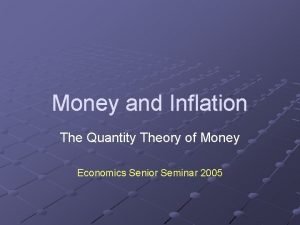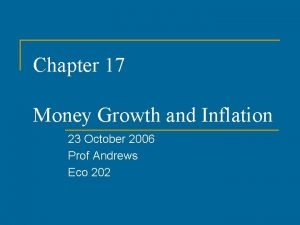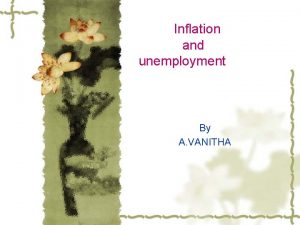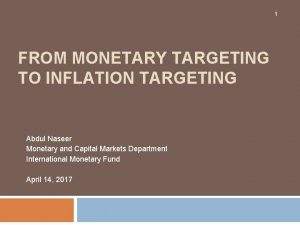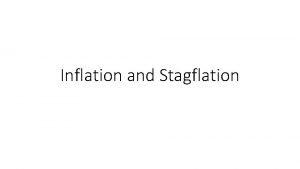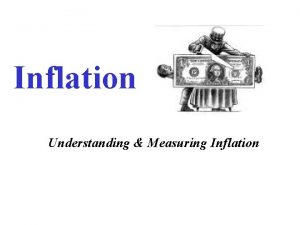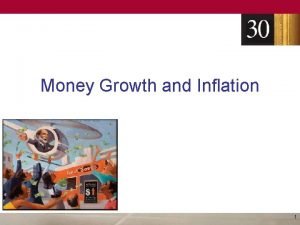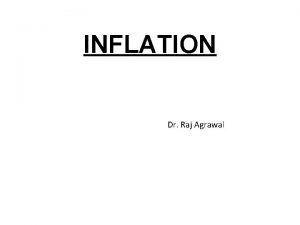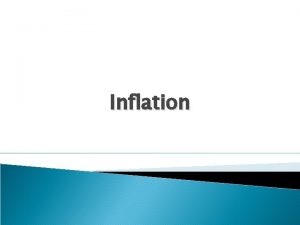Hungary Thoughts on Inflation Targeting Stephen Gilmore 19

















- Slides: 17

Hungary: Thoughts on Inflation Targeting Stephen Gilmore 19 th January 2007 0

Earlier Disinflation Experiences were Instructive Interest Rates Follow Inflation Lower Source: Bloomberg The experience of countries like Italy showed that there were gains to be made by developing accurate inflation forecasts for both spot and implied forward interest rates. 1

The Same Lesson Applied in Hungary Interest Rates Follow Inflation Lower Source: Bloomberg If anything, interest rate declines in Hungary better anticipated future inflation declines, although there was some over-exuberance in late 2002 and early 2003. 2

Market Now Looking Through Transitory Effects Interest Rates Follow Inflation Lower Source: Bloomberg In 2003/4 rates tended to track headline inflation, whereas the relationship with tax-adjusted inflation has been better more recently. 3

Tight Monetary Conditions Assist Disinflation Currencies Tend to Outperform when Monetary Policy is Tight Source: Banque AIG Among major currencies, high yielding currencies tend to appreciate in what is referred to as the “forward premium paradox”. In Hungary that effect is probably reinforced by Balassa-Samuelson and price convergence as well as MNB’s focus on the risk premium. The returns to being long HUF have been high. 4

Forward HUF Rates Became a Focus Market Reflected Perceptions About EUR Adoption Source: Bloomberg 5

Credit Spreads also Came Down with Inflation Market Reflected Perceptions About EUR Adoption Source: Bloomberg Meeting the Maastricht criteria was seen as credit positive. Euro adoption also added a non-zero probability of Euro-zone support. Early on, inflation was thought to be the binding Maastricht criterion. 6

Exchange Rate Important Exchange Rate Chosen as Indirect Inflation Target Hungary had transitioned from a crawling peg, where the rate of crawl was eventually cut to zero; Hungary is a small, open economy; The exchange rate pass through was believed to be very high; The credit channel of the monetary transmission was considered weak; and The aim of policy was to adopt the Euro as quickly as possible and that meant transitioning to ERM II. That prompted the question of whethere was much to be gained from removing the exchange rate bands if it was only to be for a short period. 7

Inflation Followed the Exchange Rate Strong Link Between Exchange Rate And Inflation Source: Bloomberg Note, though, that the relationship between the exchange rate and inflation appears to be changing – a theme we will come back to. 8

Foreigners Attracted to HUF Assets Credible Exchange Rate Target Made High Yielding HUF Assets Attractive Source: Bloomberg Non-resident holdings of Hungarian Government bonds, and their duration, increased sharply between mid-2002 and the latter part of 2003. Over the past few years Hungarian households have stepped up their foreign currency borrowing. 9

Fiscal Cycle Complicates Matters Exchange Rate Target and Exchange Rate Bands are a Constraint Source: Bloomberg The strong election cycle was even stronger than usual in 2001/2002 and posed particular problems for a monetary policy that was constrained by exchange rate bands. The fiscal boost and higher wages required a stronger than permissible exchange rate if the inflation target was to be met. 10

Speculative Attack on the Exchange Rate Bands Take Precedence Over Inflation Target In early 2003 there was an attack on the strong end of the band. More than EUR 5 billion in short term money flowed into Hungary in 2 days. The government would not contemplate a revaluation. Market participants learned or were reminded that: The exchange rate bands took priority over the inflation target. The government needed to agree to any change in the exchange rate bands. It is much easier to defend the strong end of the band than the weak end and that the costs of challenging the band could be sizable. MNB learned that: It pays to keep the currency away from the very strong end of the band. 11

Realignment of Central Parity Market Very Sensitive to Changes in Exchange Rate Target In June 2003, the forint’s central parity was devalued by 2. 26%. The currency weakened sharply. MNB hiked by 600 bp over the next 6 months. By the end of the year MNB had stopped announcing its exchange rate target. MNB and the Government were reminded that: They should be very careful in adjusting the nominal anchor. The exchange rate arrangement was a straightjacket. Market Participants were reminded that: The Monetary Council was prepared to hike aggressively when needed. 12

FX Moves Have Been Relatively Large over Last 12 Months Exchange Rate Has Become Relatively Less Important Source: Bloomberg 13

More Lessons on Exchange Rate The currency volatility and weakness coming into the 2006 elections provided another set of lessons. Exchange Rate Has The Monetary Council’s reaction to a weaker currency was far more muted than had been the case in 2003: Become -smaller inflation pass-through; -Euro adoption date pushed back to some undefined time; -Monetary Council composition change. Relatively Government comments on the exchange rate can matter. Less The external background reinforced the domestic factors. Important 14

Other Observations The Inflation Report is valuable for market participants. Exchange Rate Has Become Relatively Less The continuing improvement in the transparency of the Monetary Council is welcome. The move to a continuous, medium term point target for inflation serves to reinforce the credibility of the target, especially given the uncertainty over the possible timing for Euro adoption. The reduced emphasis on the exchange rate lessens the potential conflicts between monetary and fiscal policy, even if the maintenance of exchange rate bands still poses some potential dilemmas. Important 15

The information contained herein is being furnished for discussion purposes only and may be subject to completion or amendment through the delivery of additional documentation. This communication does not constitute an offer to sell or the solicitation of an offer to purchase any security, future or other financial instrument or product. Information is presented as of the date and, if applicable, time indicated. Banque AIG does not accept any responsibility for updating any such information. Any simulations, projections, valuations and statistical analyses contained herein have been provided to assist the recipient in the evaluation of the matters described herein; such simulations, projections, valuations and analyses may be based on subjective assessments and assumptions and may utilize one among alternative methodologies that produce differing results; accordingly, such simulations, projections, valuations and statistical analyses are not to be viewed as facts and should not be relied upon as an accurate representation of future events. Any historical or simulated results presented herein should not and cannot be viewed as an indicator of future performance. Any market views or opinions expressed herein are those of the individual sender, except where such views or opinions are expressly attributed to Banque AIG or a named individual. Market views and opinions are current opinions only; Banque AIG and the individual sender accept no responsibility to update such views and opinions or to notify the recipient when they have changed. Banque AIG and its affiliates, officers, directors and employees may from time to time have long or short positions in, buy or sell (on a principal basis or otherwise), or act as market maker in, the securities, futures or other financial instruments or products mentioned herein. Banque AIG is not an adviser as to legal, taxation, accounting, regulatory or financial matters in any jurisdiction, does not act as fiduciary or financial, investment or commodities trading advisor for any of its counterparties, and is not providing any advice as to any such matter to the recipient. The recipient should discuss such matters with the recipient’s advisers or counsel and make an independent evaluation and judgment with respect to them. Banque AIG is authorized by the Banque de France, and is regulated by the Comité des établissements de crédit et des entreprises d’investissement, the Commission Bancaire and the Autorité des marchés financiers, in France; is authorized and regulated by the Financial Services Authority in the United Kingdom; and is authorized and regulated by the Financial Services Agency in Japan. If this communication relates to a particular type of investment, activity or service made available from or through Banque AIG, London Branch, it will only be made available to market counterparties and intermediate customers, and persons who are private customers should neither act nor rely upon the information contained herein. 16
 Hungary inflation rate 1946
Hungary inflation rate 1946 Hungary inflation rate 1946
Hungary inflation rate 1946 Futanari inflation meaning
Futanari inflation meaning I am not my thoughts
I am not my thoughts Gilmore and bell
Gilmore and bell Gilmore gu
Gilmore gu Scalene triangle flower arrangement
Scalene triangle flower arrangement Kate gilmore
Kate gilmore Brianna gilmore
Brianna gilmore Kate gilmore
Kate gilmore University of west hungary
University of west hungary Hungarian traditional wear
Hungarian traditional wear Adjective country
Adjective country Sap hungary kft
Sap hungary kft Randstad hungary jobs
Randstad hungary jobs It outsourcing hungary
It outsourcing hungary Absolute location of budapest hungary
Absolute location of budapest hungary Hungary time
Hungary time
